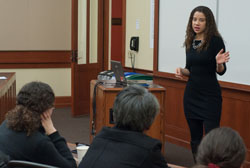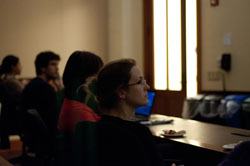Filed Under > TC Community
Not Making It on Apples Alone
"American Teacher," screened at TC in December, depicts a profession that's starved for respect -- and more.
Whoever thought education documentaries could spell big box office?
Last year brought Waiting for “Superman”, directed by Davis Guggenheim (An Inconvenient Truth) – a decidedly negative portrayal of the nation’s public school system that presented charter schools as the best (and pretty much only) hope for children in benighted urban areas.
Now comes American Teacher, co-produced by the writer Dave Eggers and narrated by the actor Matt Damon, whose mom is a teacher. The film, if not quite a rebuttal to Waiting for “Superman, certainly is a paean to the dedication and intelligence of the people who labor at the front of public school classrooms.
In early December, TC’s Gottesman Libraries held a screening of the film, in which two TC alumni – Zeke Vanderhoek, founder and Principal of The Equity Project, a New York City public school that pays its teachers $125,000 per year, and Rhena Jasey, a teacher at the school – log significant air time. Jasey spoke afterward and fielded questions from the audience.
American Teacher acknowledges that many U.S. school systems are in crisis. Former TC faculty member Linda Darling-Hammond, now at Stanford, informs us that just 16 percent of current U.S. teachers are men, versus 32 percent in 1970 – a direct reflection of the fact that heads of households can no longer support their families on a teacher’s salary. Meanwhile, women, for whom teaching used to be one of the few available careers, are seeking work in other, higher-paying fields. Today, very few top-performing college graduates are going into teaching. (Jasey, who attended Harvard as an undergraduate, tells of being frequently asked by friends, “Why would you want to do that?”) As a result, the film acknowledges, the quality of the teaching workforce has gone down, and with it, the level of student achievement.
But American Teacher celebrates teachers and teaching while indicting instead a country that undervalues what is arguably its most important profession, thus making it almost impossible for even many passionate and talented teachers to stay in the field.
“People don’t understand the intellect rigor involved in teaching,” says Marguerite Izzo, a former New York State Teacher of the Year who appears in the film. “Teachers make thousands of decisions a day about the lives of children, in the moment – and all the kids are different.”
And Eric Hanushek, a researcher at the Hoover Institute, cites his findings that an effective teacher can impart a year and a half worth of learning to a child in one year and add an additional $20,000 to the lifetime earnings of each student.
Yet in American Teacher, we see teachers working in conditions that few other professionals would tolerate, paying for books and other materials out of their own pockets, and cleaning classrooms themselves. We learn that an average teacher puts in 50-hour weeks at school and an additional 15 hours at home grading essays and other homework. Nationwide, more than 30 percent of teachers hold second jobs (including coaching school sports teams) to make ends meet.
In a particularly troubling story, American Teacher introduces us to award-winning Texas middle school teacher Eric Benner, a father of two who for the past 11 years has been teaching history, coaching football, and working nights and weekends at Circuit City. At the start of the film, Benner, who grew up in a trailer park and was the first member of his family to go to college, is thrilled about his life, calling his $132,000 home “a castle – the nicest place I’ve ever lived.” But then he gets laid off from Circuit City, and within a year, he and his wife, Ashley, blow through their retirement savings. By the time Benner finds another supplementary job – this time at the Floor Store – Ashley has left him and their home is in foreclosure.
Benner is still teaching, but he is the exception in a profession that sees 46 percent of its practitioners quit within their first five years. (Twenty percent of teachers in urban districts leave after their first year.) Such is the path taken by another teacher in the film, Jonathan Dearman, one of only three black male teachers at San Francisco’s Leadership High School. Dearman is adored by his students, not only for his teaching, but for the deep personal interest he takes in their lives.
“My role is to be a wall,” he says. “You can’t go over the wall, you can go around it or under it, but you can lean against it, and it’s there to protect you.” Yet, he quits to join his sisters’ real estate business, where, even in a recession year, he doubles his former teacher’s salary of $40,000 by showing apartments to prospective buyers.
None of the other educators in the film express anything but sympathetic understanding of Dearman’s choice.
“When you have a teacher living at the poverty level, something is wrong,” says one assistant superintendent. “We need to flip it around, to where a teacher is the most important job in our society.”
The Equity Project offers at least one model for achieving such a shift. As Vanderhoek explains, the school, which operates entirely on public funding, uses nearly all its money for teacher salaries. The school currently serves 125 students with (in addition to Vanderhoek) just seven teachers and one social worker per grade level. The teachers work, if anything, even harder than their counterparts at other schools, but Jasey (who earned a starting salary of just less than $41,000 at a previous job) told the TC audience that the arrangement fosters an esprit de corps.
“We all hang out after work on Fridays and go to each other’s holiday parties,” she said. “One guy whose sister had died told me, ‘You’re my sister now.’”
As for the money she earns now, Jasey said the main benefits have more to do with her outlook than her lifestyle.
“The thing about money is that if you don’t have to think about it, it doesn’t matter,” she said. “I just feel freer to teach. I don’t have to run around and do tutoring or beg my parents to help with the rent or eat Ramen noodles for dinner at age 32. It frees me up to be a real person and professional who can maybe even think about buying a house someday. I couldn’t do that in my old job. I could only think, ‘Maybe I’ll marry a rich person,’ like back in the 1950s.”
Published Thursday, Dec. 22, 2011

